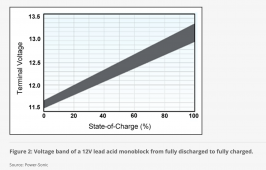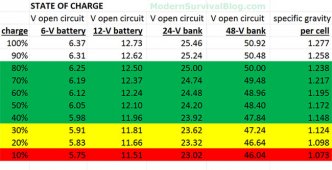You are using an out of date browser. It may not display this or other websites correctly.
You should upgrade or use an alternative browser.
You should upgrade or use an alternative browser.
Did I make a huge mistake purchasing these?
- Thread starter rmulgr
- Start date
Bob B
Emperor Of Solar
- Joined
- Sep 21, 2019
- Messages
- 8,852
Sorry, I read your post wrong ..... you are correctJust two 12 Volts, right? I only used 4 6 volt batteries. I thought it was 450 AH before DOD factored in. What is the DOD for these? 50% and what voltage can I bring them to before recharging?
wattmatters
Solar Wizard
What is the depth of discharge on a 6 volt lead acid deep cycle golf cart battery? I can't find this on the spec sheet. I am trying to find out what my realistic amp hours will be. Also, how many volts can I discharge them to? 12v? 12.2v? Help!

Learn About Batteries
Battery University™ is a free educational website offering hands-on battery information.
Read all the lead acid articles and items on charging and discharging.
How much you discharge a battery is really a matter of what sort of life expectancy you are after.
As to discharge voltage limits, it depends under what conditions you are measuring voltage. At the same state of charge the voltage while under heavy load will be significantly different to the voltage under no load. And temperature affects it as well.
Honestly the only way to know what condition batteries are in and their useable capacity is to perform a controlled test.
wattmatters
Solar Wizard
Here's a voltage chart
Charts showing SOC - voltage equivalency when a battery is unloaded nor mentioning temperature aren't particularly helpful IMO.
Bob B
Emperor Of Solar
- Joined
- Sep 21, 2019
- Messages
- 8,852
Do you have a chart that has temperature compensation accounted for?Charts showing SOC - voltage equivalency when a battery is unloaded nor mentioning temperature aren't particularly helpful IMO.
The best way to track SOC is going to be with a coulomb counter .... but even with those, the available amps is going to vary with temperature.
wattmatters
Solar Wizard
I provided a link in my post above which goes into this in great detail. Not everything makes sense as a chart.Do you have a chart that has temperature compensation accounted for?
Bob B
Emperor Of Solar
- Joined
- Sep 21, 2019
- Messages
- 8,852

Learn About Batteries
Battery University™ is a free educational website offering hands-on battery information.batteryuniversity.com
Read all the lead acid articles and items on charging and discharging.
How much you discharge a battery is really a matter of what sort of life expectancy you are after.
As to discharge voltage limits, it depends under what conditions you are measuring voltage. At the same state of charge the voltage while under heavy load will be significantly different to the voltage under no load. And temperature affects it as well.
Honestly the only way to know what condition batteries are in and their useable capacity is to perform a controlled test.
I think the OP is just looking for an easy way to have a guestimated SOC.
wattmatters
Solar Wizard
I don't think we can make such an assumption.I think the OP is just looking for an easy way to have a guestimated SOC.
Besides, it might be easy, but wrong. Tables like that convey a false sense of precision.
SOC equates with quite a wide voltage band (Voc), or alternatively any given Voc can indicate a wide range of SOCs.
e.g. an open circuit voltage reading of ~12.5V might indicate a SOC of anywhere between 50% and 80%.
It requires testing of the specific battery to narrow down the voltage band for a given SOC.
Bob B
Emperor Of Solar
- Joined
- Sep 21, 2019
- Messages
- 8,852
I don't think we can make such an assumption.
Besides, it might be easy, but wrong. Tables like that convey a false sense of precision.
SOC equates with quite a wide voltage band (Voc), or alternatively any given Voc can indicate a wide range of SOCs.
e.g. an open circuit voltage reading of ~12.5V might indicate a SOC of anywhere between 50% and 80%.
It requires testing of the specific battery to narrow down the voltage band for a given SOC.
I have seen these voltage charts used 100's of times to illustrate the approximate voltage to SOC for a lead battery.
Temperature is NOT going to have any significant effect on that unless the pack is at one end or the other of temperature extremes.
I have a hygrometer but don't remember the last time I used it ... and neither does anyone else now days unless in some special circumstance or maybe have a large storage pack where you do special care and feeding to try to make it last as long as possible.
If you are at a comfortable temperature ... use the chart for a guestimate and call it a day. When trying to determine when to stop discharging a battery .... precision isn't necessary.
Bob B
Emperor Of Solar
- Joined
- Sep 21, 2019
- Messages
- 8,852
That would be best for the longevity of the battery.From what I understand I should set the low voltage to 12.1 since I can only discharge the batteries to 50%
All this discussion of how temperature affects it is much ado about nothing unless you are operating in some sort of extreme temperature.
wattmatters
Solar Wizard
That true, which means the large band of SOC with open circuit voltage is mostly due to other factors. I never claimed temperature was the issue, only one factor.Temperature is NOT going to have any significant effect on that unless the pack is at one end or the other of temperature extremes.
The difference between discharging to 50% and discharging to 30% would be significant for the long term health of the battery. Yet the same voltage could be either depending on those factors.use the chart for a guestimate and call it a day. When trying to determine when to stop discharging a battery .... precision isn't necessary.
All I'm suggesting is the OP perform a test to establish a better understanding of the voltage-SOC characteristics of their specific battery.
You're the one going on about temperature. I only mentioned it as A factor, not THE factor.All this discussion of how temperature affects it is much ado about nothing unless you are operating in some sort of extreme temperature.
There are a range of factors which mean the SOC can vary significantly with Voc. Enough of a variance that just picking a number from a table may result in massive difference in the long term health of the battery.
Bob B
Emperor Of Solar
- Joined
- Sep 21, 2019
- Messages
- 8,852
That true, which means the large band of SOC with open circuit voltage is mostly due to other factors. I never claimed temperature was the issue, only one factor.
The difference between discharging to 50% and discharging to 30% would be significant for the long term health of the battery. Yet the same voltage could be either depending on those factors.
All I'm suggesting is the OP perform a test to establish a better understanding of the voltage-SOC characteristics of their specific battery.
You're the one going on about temperature. I only mentioned it as A factor, not THE factor.
There are a range of factors which mean the SOC can vary significantly with Voc. Enough of a variance that just picking a number from a table may result in massive difference in the long term health of the battery.
No .... YOU are the one who challenged the chart I posted saying it was totally irrelevant or something similar.
If you want to have a theoretical discussion about how temperature affects a lead battery, start a thread about that.
wattmatters
Solar Wizard
As a starting point, sure. But like I said, such tables convey a false sense of precision about what SOC equates with a particular voltage.From what I understand I should set the low voltage to 12.1 since I can only discharge the batteries to 50%
If you care about the long term health of your battery, then perform a test to establish the SOC-Voc relationship for your specific battery. It's not difficult to do.
I never said it was irrelevant. I said such tables convey a false sense of precision.No .... YOU are the one who challenged the chart I posted saying it was totally irrelevant or something similar.
That's not theoretical, its real life.
Here's a chart to explain it better:

Link:

Why the fixation on temperature? I'm talking about an integral of all factors.If you want to have a theoretical discussion about how temperature affects a lead battery, start a thread about that.
Bob B
Emperor Of Solar
- Joined
- Sep 21, 2019
- Messages
- 8,852
You went back and modified your post after I responded. That's a trick I have seen on forums many times before and why I replied to your original post.
This was your original post : "Charts showing SOC - voltage equivalency when a battery is unloaded nor mentioning temperature aren't particularly helpful IMO. "
You clearly introduced the discussion of temperature.
So .... I'm done discussing this.
This was your original post : "Charts showing SOC - voltage equivalency when a battery is unloaded nor mentioning temperature aren't particularly helpful IMO. "
You clearly introduced the discussion of temperature.
So .... I'm done discussing this.
Similar threads
- Replies
- 2
- Views
- 257
- Replies
- 21
- Views
- 1K
- Replies
- 39
- Views
- 2K
- Replies
- 17
- Views
- 810



